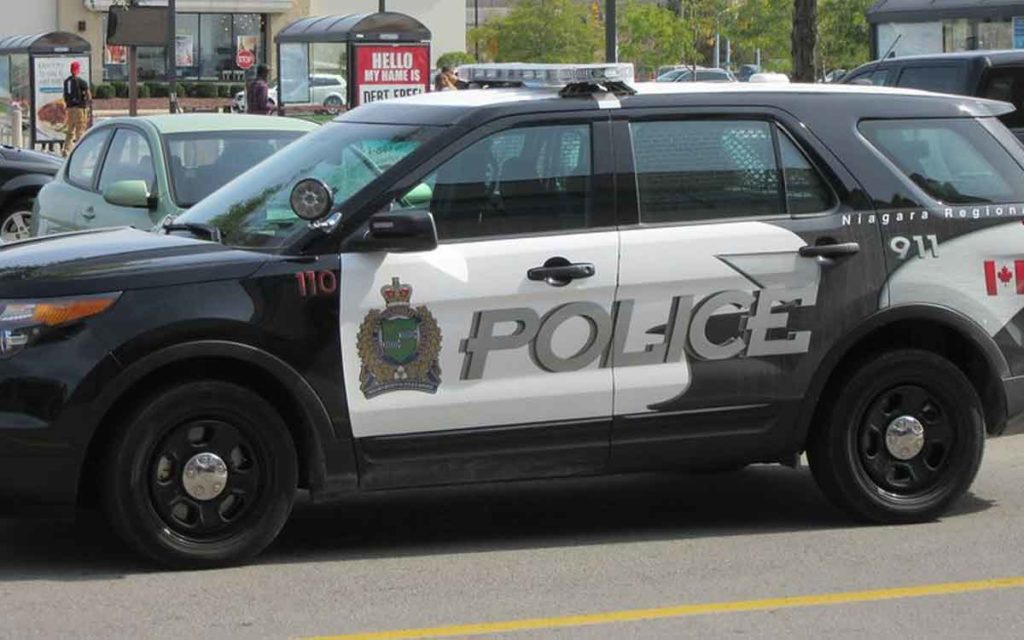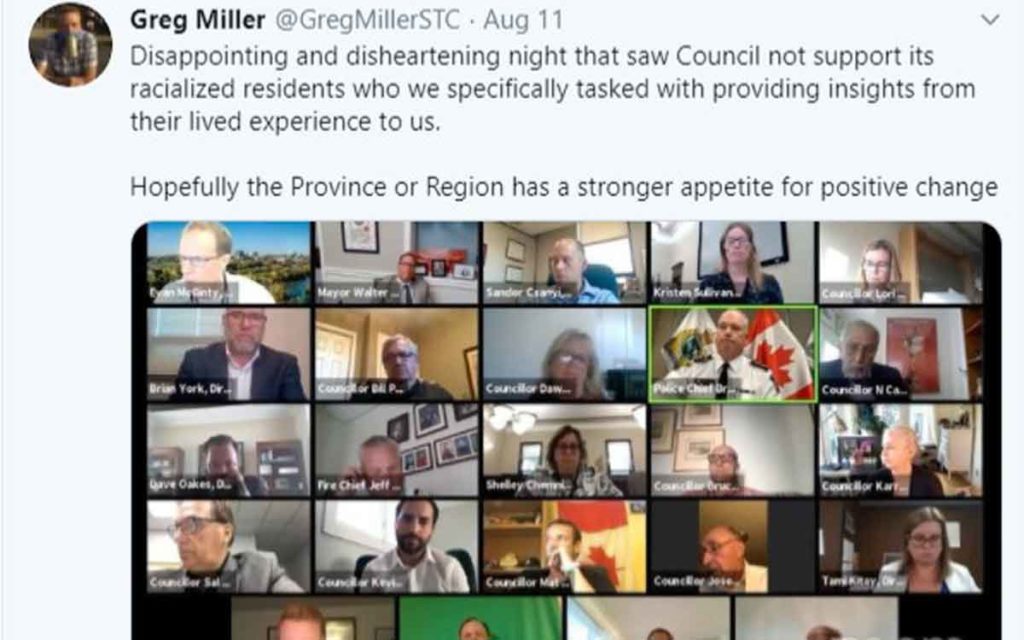(https://www.stcatharinesstandard.ca/news/niagara-region/2020/08/11/st-catharines-city-council-backs-off-on-police-body-cam-request.html)
St. Catharines city council backs off on police body cam request
Seven anti-racism committee recommendations pass, others are lost
By Karena WalterStandard ReporterTue., Aug. 11, 2020
:format(webp)/https://www.stcatharinesstandard.ca/content/dam/niagaradailies/news/niagara-region/2020/08/11/st-catharines-city-council-backs-off-on-police-body-cam-request/council_aug_10_2020.jpg)
St. Catharines city councillors on Monday narrowly voted down a motion calling for all front-line police officers to be outfitted with body cameras, one of several recommendations by the city’s anti-racism committee.
Councillors agreed to send seven of the committee’s 10 proposed police reforms to Niagara Region, including a “de-funding” proposal, but didn’t pass the implementation of body cameras, a demilitarization of the police service and a call to end street checks completely after hearing from the police chief.
“Think of the experiences of people that maybe look differently from you,” St. Patrick’s Coun. Mat Siscoe said in urging his fellow councillors, all of whom are white, to pass the recommendations.
“We’ve heard a lot from people over the last couple of weeks and months and the response has been very overwhelming that there need to be reforms.”
Siscoe tabled a motion on June 3 requesting that council call on the Region, through the police services board, to immediately begin the process of procuring and outfitting officers with cameras.
The motion was referred to the city’s anti-racism advisory committee for feedback and a more comprehensive look at the issue.
The committee agreed with the body camera implementation and also recommended nine other police reforms after receiving oral and written delegations from residents and having conversations with the NRP and Canadian Mental Health Association.
Council held off voting on the recommendations in July until it could have the police chief attend a meeting to answer questions.
Committee chair Saleh Waziruddin told council Monday there were no budget implications for the city to send the requests to the Region.
“This is asking you to add your voice. That’s really all that’s being asked here of you when you support these reforms.”
Delegate Erika Smith, speaking in favour of all the committee’s recommendations, said having body cameras would not only give a sense of peace to the community, it would also hold officers accountable for doing their jobs properly and upholding the law.
She described a recent incident she witnessed in which a Congolese man was being detained on Glenridge and someone started recording the incident on a cellphone and was met with obvious frustration from the officer.
“Police are frustrated with being filmed by the public, but the public should not have this overwhelming feeling or compulsion that we need to film the police or police the police,” she said.
“However time and time again we see police abusing their powers.”
Niagara Regional Police Chief Bryan MacCulloch told council the service won’t tolerate or permit bias and discrimination, and said the NRP from the senior level down is actively working to ensure a culture of anti-racism within the organization.
“There’s no denying the presence of systemic racism within the institution of policing, just as there is systemic racism in all social institutions,” he said.
“I’ve said that within the NRP service at first glance, we’re not seeing evidence of systemic racism, but we also know that systemic racism is difficult to identify. It’s not always overt and in your face. It’s often complex and covert. That’s why we’re committed to continuing a deeper dive.”
When it comes to body cameras, MacCulloch said the service is open and willing to have the conversation but believed it should be a provincial discussion so there is a unified approach across Ontario.
St. George’s Coun. Kevin Townsend said he was concerned about the cost of implementing body cameras, which council heard could carry a $3 million price tag.
“It should be something the province should be mandating, it’s not something the local municipalities should have to pay for out of property taxes.”
But Merritton Coun. Lori Littleton said council should back all the committee’s recommendations.
“When we have a committee, an anti-racist committee that says these are some recommendations to help battle the decades upon decades of systemic racism that we face, we as a council who struck that committee, have the obligation to pass on that correspondence, to back the work of that committee.”
The body camera motion was lost 7-5.
The anti-racism advisory committee’s recommendation to end street checks due to racial discrimination was lost on a tie 6-6.
MacCulloch told council new legislation in 2016 replaced street checks — now the collection of identifying information in certain circumstances — and it falls under provincial jurisdiction.
He said it was used by officers 40 times in 2017, three times in 2018 and wasn’t used in 2019. MacCulloch said officers are not given carte blanche to use the legislation on a whim and it must be used under certain circumstances.
Also lost on a 6-6 tie was a recommendation for the de-militarization of the NRP. The committee had called on the service to sell its armoured vehicle and ban the use of tear gas, pepper spray or other chemical agents against protesters or at demonstrations.
MacCulloch told council that the armoured vehicle is a mobile piece of safety equipment he feels he is obligated to provide to members in high risk situations. He said tear gas hasn’t been used against protesters or demonstrators in Niagara that he was aware of and the policy doesn’t permit it to be used in those types of scenarios.
Councillors did pass a “defunding” recommendation as part of a block of reforms. The idea is to remove welfare checks, metal health and suicide threat calls from police responsibility and shift the associated budget dollars to a dispatched civilian service, such as EMS.
Also being sent to the region is a recommendation to establish a civilian ombudsperson with full access to police records and data, and a request that the NRP publish more online statistics on reported hate crimes and its own use of force by race data.
Other recommendations passed involved requiring officers to have a duty to intervene against excessive force or abuse and be prohibited from shooting at moving vehicles.
As well, council backed the idea that complaints and concerns against police officers relating to use of force, particularly when the complainant is radicalized, should be reflected and factored into the officers’ performance review or promotion.
They also asked the NRP to increase diversity hiring to at least 15 per cent of the recruiting class and unanimously supported the recommendation to increase crisis intervention training. It included adding cross-cultural mental health training to that crisis intervention training and adding anti-bias and anti-racism training to its refresher training, lead by experts from equity seeking groups.
CLOSE VOTES
Implement body cameras for all front-line officers:
Yes: Littleton, Miller, Porter, Siscoe, Sendzik
No: Phillips, Sorrento, Townsend, Williamson, Dodge, Garcia, Kushner
End street checks completely
Yes: Miller, Littleton, Porter, Siscoe, Williamson, Sendzik
No: Townsend, Kushner, Garcia, Phillips, Dodge, Sorrento
Demilitarization: Sell armoured vehicle and ban the use of tear gas, pepper spray or other chemical agents against protesters or at demonstrations
Yes: Littleton, Miller, Porter, Williamson, Sendzik, Siscoe
No: Townsend, Garcia, Phillips, Sorrento, Kushner, Dodge
Note: Coun. Matt Harris attended the meeting but declared a conflict on police issues





:format(webp)/https://www.stcatharinesstandard.ca/content/dam/niagaradailies/news/niagara-region/2020/08/11/st-catharines-city-council-backs-off-on-police-body-cam-request/council_aug_10_2020.jpg)



:format(webp)/https://www.stcatharinesstandard.ca/content/dam/niagaradailies/news/council/2020/08/09/special-regional-meeting-with-the-niagara-regional-police-on-diversity-equity-and-inclusion-set-to-resume/chief_macculloch_at_protest.jpg)